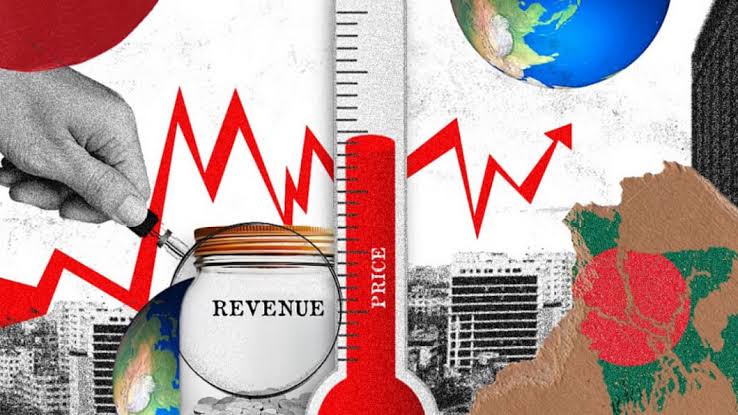Special Correspondent
Published:2025-08-09 13:31:14 BdST
BD’s economy: Crisis remains despite some gains
Following the government’s downfall in a popular uprising, Bangladesh’s economy—plunged into deep crisis amid political instability—has shown signs of recovery in several indicators.
However, its main engine, the private sector, remains stagnant. High interest rates, foreign currency shortages, and lack of investor confidence have caused private sector credit growth to fall to a two-decade low. Revenue mobilisation remains sluggish despite ambitious targets, and GDP growth has declined. Nonetheless, there are positive signs in exports, remittance inflows, and external transactions.
Despite relief from record remittance earnings, improved reserves, timely debt repayments, foreign investment and accelerated container handling, economists argue that unless confidence is restored among entrepreneurs, these gains will not be sustainable.
Paralysing Private Sector Persists
Business leaders and analysts say the private sector remains crippled due to high interest rates, persistent foreign exchange shortages, import controls, and investment uncertainty.
Stagnant investment, reduced production, and limited access to bank loans have heavily impacted private entrepreneurs, resulting in sluggish industrialisation, employment generation, and export growth.
Private Sector Credit Growth at Record Low
Amid an investment drought, credit growth in the private sector has dropped to its lowest in 22 years—standing at 6.4% at the end of June. Data from the central bank shows that even during the COVID-19 pandemic, growth was above 7.5%.
Insiders note that since the fall of the Awami League government on 5 August last year, credit growth has declined month-on-month. In July of the same year, private sector credit growth was 10.13%.
Anwar-ul-Alam Chowdhury, President of the Bangladesh Chamber of Industries, said, “The current government has failed to win the trust of the business community. Its focus on the private sector is minimal, causing existing businesses to suffer. The overall economic growth of the country is being hampered due to this lack of confidence.”
He added, “Amidst such uncertainty, the announcement of the upcoming elections has sparked fresh hope among business leaders.”
Revenue Collection Concerns
For the 2025–26 fiscal year, the revenue target has been significantly raised compared to 2024–25. This places the National Board of Revenue (NBR) under pressure to achieve 35% more in collections. The income tax target alone has increased by 42.63%—one of the highest in NBR’s history—while VAT is expected to grow by 30.49% and customs duties by 29%.
The NBR must collect BDT 4.99 trillion this fiscal year, up from BDT 3.7 trillion last year, when revenue growth was only 2.23%—among the lowest on record.
Dr Mustafa K Mujeri, an economist, noted, “Revenue collection only increases when the economy is in good shape. Business and industrial activity have slowed significantly over the past year. As a result, tax collection has been disappointing.”
He added that there is a lack of momentum in tax collection, the business environment remains unstable, production costs have risen, and profits have fallen—making it harder for businesses to pay additional taxes. Internal instability within the NBR, weak ADP implementation, stagnant investment, and sluggish business performance also contribute to the challenge.
Export Growth Continues
In July—the first month of FY2025–26—export earnings reached $4.77 billion, a 24.9% increase compared to the previous year. Of this, $3.96 billion came from the readymade garments sector, up 24.67% year-on-year. For the full FY2024–25, total export earnings rose by 8.58% to $48.28 billion.
Remittance Hits New Record
Following the political transition, there has been a surge in interest among expatriates to send remittances. In July alone, remittances totalled $2.47 billion—nearly 30% higher than the same month last year. Over the course of FY2024–25, total remittance inflows reached a record $30.32 billion—the highest in the country’s history.
Foreign exchange reserves, previously in decline, have now reached $30 billion. The dollar shortage is easing, and businesses are finding it easier to open Letters of Credit (LCs).
Record Debt Repayment
Despite inheriting a debt burden of $156 billion from the Sheikh Hasina administration, the current government repaid a record $4.08 billion in foreign loans this year. Prioritising debt repayment over acquiring new loans, the government signed new agreements totalling only $8.32 billion in FY2025–26.
$3 Billion Surplus in Balance of Payments
For FY2024–25, Bangladesh recorded a surplus of $3.29 billion in its balance of payments—thanks to rising exports and remittances—after years of deficits in previous fiscal cycles.
Trust Returns to Banks
Confidence is gradually returning to the banking sector, which suffered from mismanagement under the former administration. By May, total bank deposits reached BDT 18.32 trillion, reflecting 7.73% year-on-year growth.
Foreign Direct Investment Up
Net foreign direct investment stood at $865 million in Q1 of 2025—up 76% from the previous quarter and 114% compared to the same period last year.
Per Capita Income Increases
Per capita income rose to $2,820 in FY2024–25, up $82 from the previous year and the highest in Bangladesh’s history.
Increased Container Handling
The Chattogram Port handled 3.296 million TEUs of import-export containers in FY2024–25—up 4.02% from the previous year. Notably, this figure surpassed the previous year’s record 15 days before the fiscal year ended.
GDP Growth Slows
GDP growth dipped slightly to 3.97% in FY2024–25, down from 4.22% the previous year. The slow pace in agriculture, industry, and services contributed to the decline.
Expert Analysis
Dr M Masrur Riaz, Chairman of Policy Exchange Bangladesh, commented, “Before 5 August 2024, the economy was on a steady decline, due to gross policy failures by the previous government, which prioritised optics over substance. This led to serious repercussions across the financial sector.”
He added, “The interim government has managed to reduce money laundering and banking sector fraud. Reforms in banking and financial institutions have helped the economy to recover. However, the distance between the government and the private sector has only widened, and effective dialogue remains absent.”
Unauthorized use or reproduction of The Finance Today content for commercial purposes is strictly prohibited.


